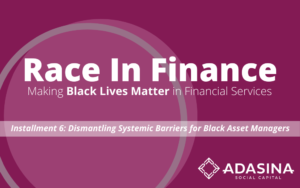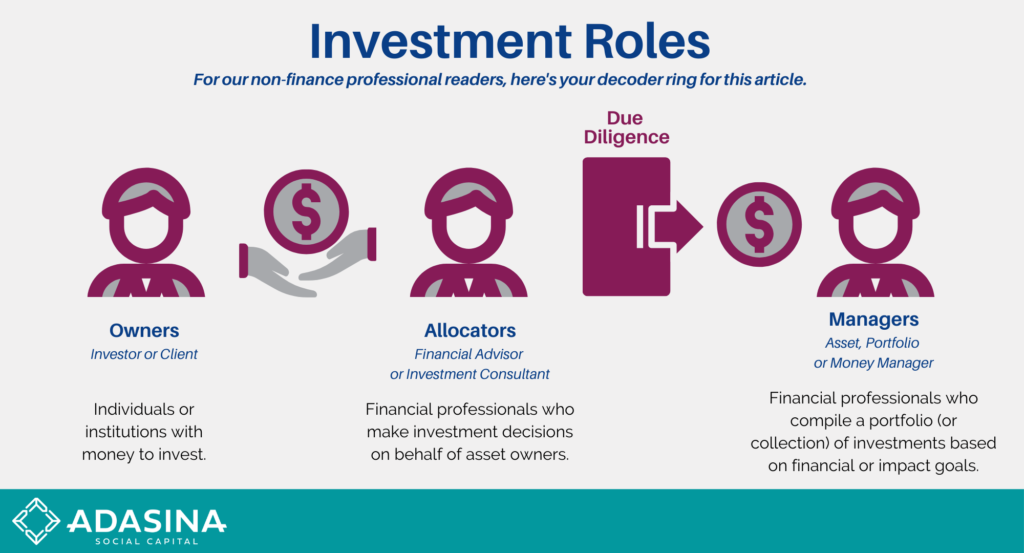
By: Rachel J. Robasciotti, Founder & CEO
This article is part six of a series about race and racism in financial services. The full series can be read here.
***
When you Google my name, do you know what autofills? “Rachel Robasciotti Net Worth.” Do people think that being a Black, queer, woman Asset Manager who focuses on social justice leads to a life of riches? Let me be clear. It does not. Even with unprecedented levels of demand for values-aligned investing combined with stated intentions to source more Black talent in financial services, our Black-owned social justice investing firm is not out here striking it rich. Yes, we are successful, but given the stated demands, we should be managing hundreds of millions more in investment assets than we currently manage.
What’s holding back our further success? An outdated due diligence process that maintains the status quo and keeps investments where they have always been, and that’s not in the hands of Black folks.
The problem isn’t due diligence itself; fiduciary and diligence considerations are absolutely necessary when taking care of money for clients. The problem lies in how the Asset Manager evaluation process exacerbates existing inequities in financial services, while also failing to account for real impact and diversity outcomes. If impact, Asset Manager diversity, or both is what you want, you have to adjust your process to center those factors.
Throughout this article, I use some financial industry terms for roles that people assume in the investing process, these include the roles of Asset Owner, Allocator, and Manager. Please see the diagram below for descriptions of each.
 Text in Graphic: Investment Roles. For our non-finance professional readers, here’s your decoder ring for this article. Owners (Investor or Client): Individuals or institutions with money to invest. Allocators (Financial Advisor or Investment Consultant): Financial professionals who make investment decisions on behalf of asset owners. Managers (Asset, Portfolio or Money Manager): Financial professionals who compile a portfolio (or collection) of investments based on financial or impact goals.
Text in Graphic: Investment Roles. For our non-finance professional readers, here’s your decoder ring for this article. Owners (Investor or Client): Individuals or institutions with money to invest. Allocators (Financial Advisor or Investment Consultant): Financial professionals who make investment decisions on behalf of asset owners. Managers (Asset, Portfolio or Money Manager): Financial professionals who compile a portfolio (or collection) of investments based on financial or impact goals.
Asset Allocators help individuals and institutions manage their investments. Those professionals owe a duty of care to their clients. This duty of care includes reviewing potential investments and investment Managers (“due diligence”) to ensure that the people making investment decisions are experienced and that risk and reward are appropriately balanced. To make the due diligence process more efficient, Allocators often codify due diligence into an inflexible process. Although this may streamline work for Allocators, the system currently in use disenfranchises Black Managers.
The point of due diligence is to ensure that Asset Owners’ money is managed by experienced, trustworthy professionals with acumen to do their job well. While this process stems from the good intentions of assessing risk to protect Asset Owners, the outcome has been a persistently homogeneous field of Asset Managers that lacks diversity across race, gender, and class background. Using these processes is what led us to where we are now, a financial services field that continues to be dominated by 98.7% white male Asset Managers1, financing a world that codifies systemic racism and faces historic environmental and public health crises2.
As my grandmother would often say, if we keep doing what we’ve always done, we’ll keep getting what we already have. We are overdue for an overhaul of the industry-standard due diligence process.
Let’s break it down.
The traditional due diligence process usually begins with an Asset Manager completing a Request for Proposal (RFP), which is essentially an application. Applications are for situations where there are many sellers and few buyers. Application processes are, by their nature, competitive; ostensibly the “best” applicant is chosen among many potential options.
This selection system was built for the old economy, based upon this power dynamic:
- Allocators hold the power. They are empowered to not only choose between applicants, but also to determine which metrics are important in the evaluation process, and when to make exceptions.
- Managers are the applicants. To earn the possibility of being considered, applicants are tasked with answering lengthy questionnaires (I’ve seen one with over 1,000 questions) and navigating a time-consuming, and often burdensome, interview and paperwork-submission process.3
Continuing to use this antiquated application process no longer makes sense.
Asset Owners are telling Allocators that they want their investments to work towards real social justice and that they want Manager diversity along with their financial returns.4 Asset Managers offering substantive social justice investment solutions and Manager diversity are scarce. With both of these in high demand, there are far more buyers than sellers. To close this gap between supply and demand, we must rethink our systemically unjust Manager evaluation systems.
Given this paradigm shift, it makes sense for Allocators, rather than Managers, to hold more of the weighty burden of due diligence processes. But, Allocators continue to expect firms made up of people from historically underrepresented and under-resourced groups to conform to their outdated processes.5
While ostensibly intended to provide an objective evaluation of a Manager’s ability, these lengthy applications and traditional measurements do not actually explicitly assess an Asset Manager’s skills or abilities. Diverse Managers typically face industry-standard thresholds for assets under management (AUM) and track record requirements that overwhelmingly favor those who already manage significant assets. Though these standards for due diligence consideration (typically a minimum of $200 million under management and a three-year track record) are a difficult hurdle for any emerging Manager, the AUM and track record standards are disproportionately harder for Black Asset Managers to achieve.
As a result of systemic inequities, Asset Managers who can meet the $200 million threshold are more likely to come from a traditional finance background, have existing wealthy networks willing to invest based on relationship alone, and/or have personal or family wealth to draw upon during the initial three-year period. Black people are both underrepresented in financial services6 and face an enormous wealth gap7, so they are far less likely to have the advantages that enable other Asset Managers to meet these thresholds.
Due diligence processes that require these thresholds be met, or offer exemptions from these requirements based on relationships, exacerbate systemic racism in financial services. The problem is systemic, so we need to rethink our systems.
Solutions
So, what should we do? Fortunately, Allocators can now find resources, several by people of color, that offer robust due diligence alternatives and access to diverse Managers.
Forward-thinking Asset Allocators can update their due diligence processes in a number of ways to be more inclusive. In an effort to provide actionable changes, over a dozen BIPOC (Black, Indigenous, and People of Color) Managers in collaboration with the investment committee of a multi-billion dollar Allocator created this Due Diligence 2.0 Commitment. It includes nine specific shifts Allocators can make in the due diligence process to remove systemic barriers to Black, Indigenous, and other Asset Managers of color, while continuing to meet fiduciary responsibilities, including:
-
- Offer Transparency about Hurdles
-
- Consider Track Record Alternatives
-
- Reassess Assets under Management as a Risk Metric
Asset Allocators who want to embrace social justice and racial equity will only achieve a diverse Manager pool by using new evaluation processes that do not continue to replicate the status quo of a disproportionately white Manager lineup. If you are an Allocator, I invite you to look at the commitment for ideas, and if it resonates, sign it and join us in this work!
In addition, Allocators can subscribe to publications like Emerging Manager Monthly and use their no-cost Diverse Manager Directory when sourcing new Managers. The Diverse Asset Managers Initiative (DAMI) is also an excellent resource for Asset Allocators looking to find diverse Managers and make their processes more accessible.
Wealth and financial services in the United States were built upon and by Black bodies, while systematically excluding Black people from building wealth for themselves.8 So far, the investment industry has only reinforced and exacerbated these historic inequities. But, by actively dismantling systemic barriers for Black Asset Managers, we can meet asset owner demand and make finance a more diverse and inclusive industry.
Endnotes:
- Knight Foundation, “Diversity of Asset Managers in Philanthropy,” Knight Foundation (February 12, 2020).
- Renee Morgan, “Reckoning With Our History,” Adasina Social Capital (July 24, 2020).
- Global Impact Investing Network, “A Guide for Impact Investment Fund Manager: Conducting Due Diligence,” Global Impact Investing Network (2021).
- Cerulli Associates, “Allocators Increasingly Evaluate Managers Through an ESG Lens,” Worldwide Asset Management & Distribution Analytics (October 2020).
- Tracy Gray and Emilie Cortes, “How Foundations Fail Diverse Fund Managers and How to Fix It,” Stanford Social Innovation Review (December 17, 2020).
- Edgar Villanueva, “Money as Medicine,” Stanford Social Innovation Review, (May 21, 2018).
- Jenna Ross, “The Racial Wealth Gap in America: Asset Types Held by Race,” Visual Capitalist (June 12, 2020).
- Renee Morgan, “Reckoning With Our History,” Adasina Social Capital (July 24, 2020).